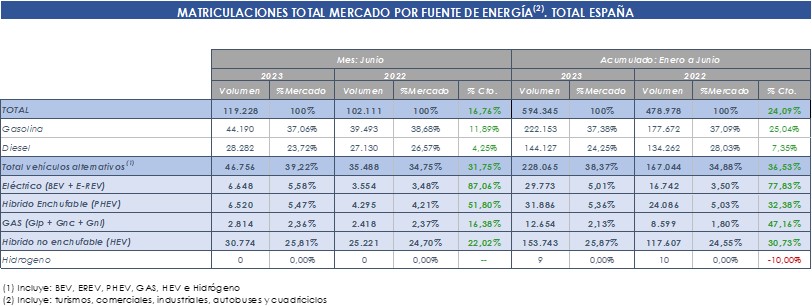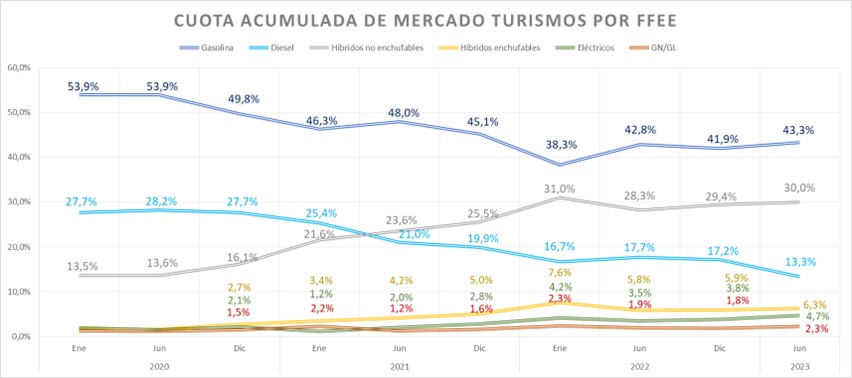In the sixth month, 13,168 electrified sales were registered, representing 11% of the total market
In the first semester, 55,542 sales of electrified passenger cars were accumulated, a figure still insufficient to reach the goal of 190,000 electrified passenger cars in 2023
In June, close to 40% of sales corresponded to zero and low emission vehicles
Madrid, July 3, 2023.- Sales of electrified vehicles (electric and plug-in hybrids, including passenger cars, quadricycles, commercial and industrial vehicles, and buses) increased by 67.8% in June, with 13,168 units sold. Electrified vehicles manage to increase 3 p.p. its market share, representing 11.04% of general sales. Even so, the sales rate is still low and must be increased to reach the 190,000 units of electrified passenger cars set for this year.
Regarding registrations of alternative vehicles (electrified, hybrid and gas), they increased by 31.7% in the month, with 46,756 units sold. Sales of this type of vehicle, once again, are the first purchase option for users, with 39.22% of market sales, surpassing gasoline (37.06%) and diesel (23.72%) vehicles. %).

ELECTRIC VEHICLES – Zero Label
Sales of pure electric vehicles increased 87.1% in June, with 6,648 registered units. It represents 5.58% of the market share in the month. In the year as a whole, sales of these vehicles totaled 29,773 units, 77.8% more than in the same period of the previous year. The cumulative share of the year is 5.01%
PLUG-IN HYBRID VEHICLES – Zero Label
Sales of plug-in hybrid vehicles grew by 51.8% during June and reached 6,520 registered units this month. It represents 5.47% of the market share for the month. In the year as a whole, sales of these vehicles totaled 31,886 units, 32.4% more than in the same period of the previous year. The cumulative quota for the year is 5.36%.
HYBRID VEHICLES – ECO Label
Sales of non-plug-in hybrid vehicles increased by 22% during June, reaching 30,774 registered units this month. It represents 25.81% of the market share in June. In the accumulated year, sales of these vehicles accumulated 153,743 units, 30.7% more than in the same period of the previous year. The share of the total for the year is 25.88%.
GAS VEHICLES – ECO Label
Sales of gas vehicles grew 16.4% in May with 2,814 registered units representing 2.36% of the market share in the month. In the year as a whole, sales of these vehicles accumulated 12,654 units, 47.2% more than in the same period of the previous year. The cumulative quota for the year is 2.13%.
TOURISM MARKET
The registrations of electrified, hybrid and gas PASSENGER CARS increased their sales in June by 30.8% compared to the same month of the previous year, up to 44,956 units delivered, which represent 44.47% of the total market share and the first purchase option for citizens and companies.

Regarding the electrified passenger car market, in June its sales increased by 61.1%, with 11,912 units sold. Battery electric (BEV) grew 73.6% to 5,474 units in the month, as did plug-in hybrids (PHEV) that increased their sales by 51.7% with a total of 6,438 units. Sales of electrified passenger cars come to represent 11.78% of the market share in June. While, in the accumulated year, there are 55,542 electrified passenger cars, 45.7% more, which represents 11% of the total market.

Sales of electrified passenger cars manage to increase their sales volume compared to the same month of the previous year, but both the rate of entry and the volume of sales are still less than necessary. According to forecasts, the electrified market will close at around 110,000 units, a figure that would be well below the 190,000 set for 2023 to achieve the emission reduction targets required in the Fit for 55.

José López-Tafall, general director of ANFAC, pointed out that “compared to the previous year, the electrified vehicle market has a continuous growth rate, but this rate would have to be even higher. In the first half of the year, only 11% of sales are electrified, while in the rest of Europe they double our share and continue to grow. Spain does not have a supply problem, it has a scarce and little stimulated demand. From ANFAC, we celebrate the approval of the deduction of 15% of personal income tax for the purchase of electrified vehicles, a measure that we have been proposing for some time. It is an important first step, but it must be accompanied by more measures that promote and encourage the purchase of this type of vehicle. In the future we have to find an alternative system that allows the aid to be collected at the time of purchase and, in parallel, reduce the processing and administrative costs that the current model imposes on all the administrations involved, and that only make available these move very slowly. We face a tough requirement set in the Fit for 55 with the emission reduction objectives where electrification is the main commitment to achieve it”.
